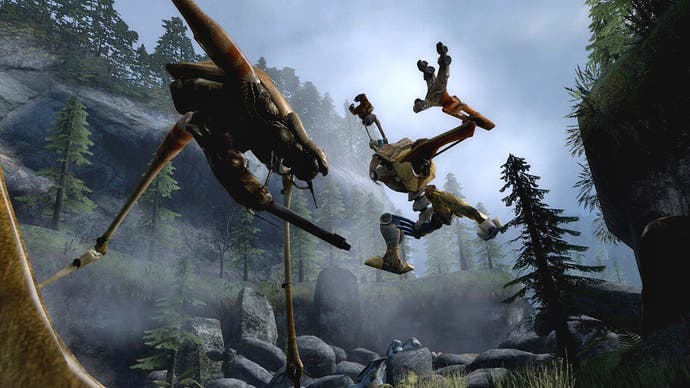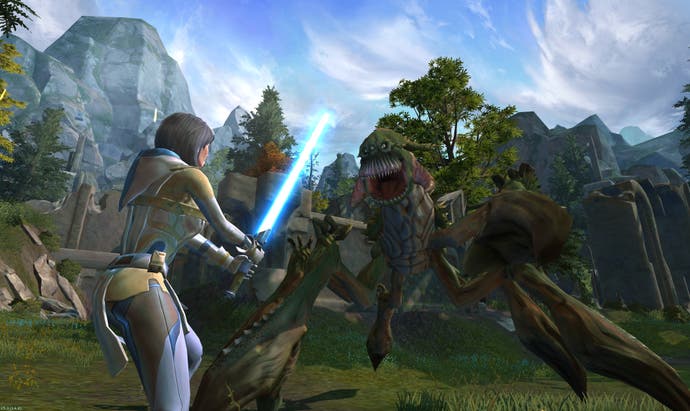Why Devs Owe You Nothing
When does a game belong to its fans rather than its creators?
Last week, 10,000 people took to Steam to play Half-Life 2 as part of a gentle protest against Valve's silence on the development of the series' next instalment. It's part of an ongoing campaign that rose from the background noise of forum discontent to deliver an open letter to Valve.
"The lack of communication between Valve and the Half-Life community has been a frustrating experience," it reads. "Fans of the Half-Life series have waited years for a word on when the franchise will return. [...] Waiting patiently for over four years is a daunting task [...] fans should at least be acknowledged in some way, regardless of developmental plans for the next Half-Life project."
Of course, you don't have to go far on the internet, much less in gaming, to encounter egregious displays of self-entitlement. That particular mixture of naivety and self-absorption is the principle feature of an X-Factor generation, regularly flattered into thinking their views are of vital importance by cheap marketing initiatives to "drive engagement" - rhetorical questions on Facebook; the Like button; text to vote now! Why not get on YouTube and unload your soul into the digital ether? You are worth it, you beautiful snowflake.
The result of this ego-frotting evil is a surge of righteous individualism that is at once incredibly socialised and gallingly self-centred. People appear offended that anyone else has the temerity to exist on their internet. People bark death threats in comments threads when a review knocks down the Metacritic of a game they haven't even played. People decry their favourite musicians when they dare to try new genres or, God forbid, make a living. People, man. What a bunch of jerks.

The misapprehension by consumers that they're owed something by creators is hardly a new phenomenon, nor unique to gaming. And yet there are reasons why gaming, and its increasing transformation from product to service, creates a peculiar challenge for developers trying to negotiate the gauntlet between popular appeal and enslavement to the populace. Gamers, increasingly, do expend creativity and money in shaping the digital worlds they inhabit - and, unlike in other media, there are often valid reasons for them to feel a degree of ownership over the games they play.
MMOs have it worst. Not only do they have to continuously appease fans to keep their coffers full, but the kind of game that emerges from a full server is very much dependent on what the players make of it. There's no better illustration of this than in CCP's volte-face regarding the governance of its player-driven space MMO EVE Online. Without that community, CCP doesn't have a game at all, not only in the sense that it wouldn't be able to generate revenue from a playerbase of zero, but because the entire game is reliant on its players to form corporations - the self-organising Machiavelli-factories that dictate the political machinations and economy of the entire galaxy.
CCP fell afoul of its audience because it forgot that it was in partnership with them to create the game. Instead, the developer embarked on a course of action that was perceived to be an aggressive and manipulative way to monetise the playerbase. This did not go down well. "Why should we pay a gazillion space groats for an avatar's monocle?" wondered hardcore spacenerds. "This is our game!"
And CCP, belatedly, conceded that this was the case. Here's the money shot from CEO Hilmar Veigar Pétursson's apologetic letter to fans: "The greatest lesson for me is the realisation that EVE belongs to you, and we at CCP are just the hosts of your experience. When we channel our passion for EVE constructively, we can make this vision a reality together."
He talks about the vital importance of collaboration with the community, and regrets CCP's recent estrangement from it. He also talks of digital items, and how it is the purchase of these, rather than subscriptions, which will become the dominant model of funding for MMOs. It's another important area in which players' ownership of a game is ambiguously defined. Legally, it is usually the developer that owns your goods, no matter how much real world cash you splurged on them. In buying the Flaming Dong-Sword of Ultrawang, you are buying nothing but access to an item that the company owns in perpetuity - and can withhold at a moment's notice.

This is increasingly a legally tortuous area, not least because it can be exploited for entirely criminal purposes. Here's an article I wrote for Edge a while back, after I went to meet Taiwan's biggest MMO publisher, Gamania. They have a problem with hacking, as many MMO companies do - but the thieves aren't after credit card data; they're after your sweet loot, which they then resell. It's an organised, industrialised criminal enterprise which is worth millions of actual real world bucks. And there's not much the authorities can do about it because stealing something that doesn't actually exist isn't a crime with the same international heft as credit card fraud.
Players' very real investment in games can end in digital disaster as a result of entirely legal shenanigans, too. Even fluffy, cuddly PopCap impoverished its players by closing down Baking Life at the end of January, consigning any "Zip Cash" bought with real money to the void known as John Riccitiello's Cryogenics Fund. The terms and conditions are essentially a giant blinking LOL to player investment - as are, PC Gamer pointed out, the terms of League of Legends. Buyer beware.
How long will players stand for it? Valve is perhaps aware that they won't. Although the legal status of virtual items isn't explicitly described in Steam's terms of service, or in the Steam Trading guidelines, by encouraging players to submit hats and weapons to be sold via Team Fortress 2, Valve is fostering a direct collaboration with the community - one which sees contributors reimbursed via royalties on the sale of their kit.
"It benefits us because it grows the community, right?" said Valve's Grand Poobah, Gabe Newell, speaking to Gamasutra in 2010. "Team Fortress 2 is a better product because we have community contributions in it. They're going to go off and listen to what the community says about how they can do that better, and we can draft along, as we both benefit."
Being so involved in the game's continued profitability for Valve, the TF2 community has a more legitimate mindshare in the direction of TF2 than do players of other Valve games. It's hard to see how Half-Life 2 players, for instance, continuously contribute to the profitability of Valve, or indeed help to increase potential profits of Half-Life 3 - except in the tangential sense that they have sustained a low-level marketing buzz around the series.

HL2 isn't a service. Fans aren't asked for repeat payment, and they are under no obligation to support Valve in any way. When they complain it has somehow been exhausting to be a fan, it is baffling. It is extremely easy to be a fan; you don't even need to get out of your chair. And yet, that sense of entitlement remains, fed by flattery from social media, by the ongoing confusion over digital rights, by the increasing collaboration of developers and communities.
I can understand the desire. I have played HL2 through to completion more times than I have bothered to count and I never tire of writing about how much I love it. In the years I've worked in this industry, only Gabe Newell's awesome presence has reduced me to gibbering mid-interview. Needless to say, like the fans who signed that open letter, I will certainly play whatever instalment Valve issues next, whenever it emerges. But I also recognise that my desire has no impact, nor should have, on Valve's PR policy, much less its development schedule - and it would be naive to think that the two are unrelated, as the open letter does.
That demand, like the DDOS attack on Minecraft because its developers weren't seen to be working hard enough, like the one-star ratings for a great app that asks you to pay a dollar for a massive expansion pack, like the complaints that an erroneously low sale price should be reinstated because a few lucky people snapped up a game for a pittance, like the death threats to Ninja Theory for changing a character model... Like these things, that demand is part of an unseemly wail of self-righteousness issuing from the feed-me-more generation, unabashed by its over-consumption and tutored by the media in narcissism.
Of course I want to know more about Episode 3 or Half-Life 3, or whatever it may be that Valve pulls out of its hat. But even in these times of community collaboration and digital ownership, the Half-Life series remains Valve's and Valve's alone. It is entirely its prerogative. Maybe, just maybe, it will respond to the baiting, sensing a goodwill windfall - it is a company renowned for spontaneous acts of generosity, after all. But just because someone's willing to give, doesn't make it polite to ask.

